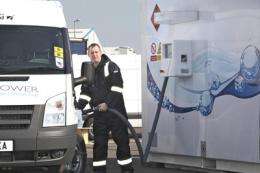Filling up, with hydrogen fuel (image courtesy of ITM Power)
National Physical Laboratory has developed a suite of analytical methods to detect trace-level impurities in hydrogen fuel that can affect the performance of hydrogen fuel cells – a potentially carbon-free power source for vehicles.
Hydrogen-powered vehicles emit nothing more harmful than water at the point-of-use, so they have great potential to reduce our dependence on fossil fuels and therefore help combat climate change. There is, however, a pressing industrial need for accurate and traceable measurements of the purity of hydrogen fuel, as even parts-per-billion levels of some impurities can severely reduce the power output of fuel cells.
The suite of methods developed at NPL, in a collaborative project with ITM Power, Air Products and the UK Hydrogen and Fuel Cell Association, will enable industry to ensure hydrogen dispensed at refuelling stations meets required quality specifications.
The methods allow the measurement of a range of impurities such as oxygen, carbon monoxide and carbon dioxide, as well as less stable species such as sulphur compounds and formaldehyde that require specialised sampling and analysis. Tests found that the methods used could detect each impurity to the levels set in the International Standards being developed for the specification of hydrogen fuel (ISO 14687-2 and ISO 14687-3).
The project also tested the suitability of hydrogen fuel produced via electrolysis, by testing samples provided by ITM Power's electrolyser systems, which produce hydrogen by splitting water molecules using electricity generated from renewable sources. The results showed that fuel produced in this way does not require any further purification, other than the relatively inexpensive removal of water and oxygen.
Dr Andrew Brown, the scientist responsible for hydrogen purity projects at NPL, said: "The success of the analytical methods developed by NPL provides UK industry with a much needed source of quality assurance for measurements of hydrogen purity. The results of this collaborative project bode well for the future of hydrogen as a fuel source, as leading UK companies such as ITM Power strive to develop innovative technologies to help make hydrogen refuelling stations as ubiquitous as petrol stations are today."
Graham Cooley, CEO of ITM Power, commented: "ITM are committed to achieving the right hydrogen purity for its customers. NPL is the best placed organisation in the UK to develop appropriate gas analysis and provide independent assessment. We look forward to using the results across our product portfolio."
More information: More on NPL's work on hydrogen purity analysis and storage.
Provided by National Physical Laboratory



















